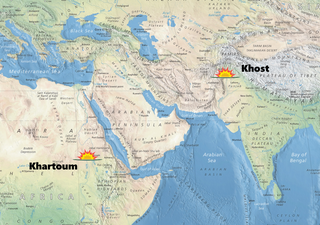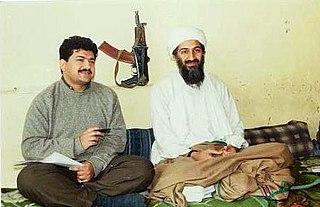
Al-Qaeda is a pan-Islamist militant organization led by Sunni Jihadists who self-identify as a vanguard spearheading a global Islamist revolution to unite the Muslim world under a supra-national Islamic caliphate. Its membership is mostly composed of Arabs, but also includes people from other ethnic groups. Al-Qaeda has mounted attacks on civilian, economic and military targets of the US and its allies; such as the 1998 US embassy bombings, the USS Cole bombing and the September 11 attacks. The organization is designated as a terrorist group by NATO, the UN Security Council, the European Union, and various countries around the world.

Osama bin Mohammed bin Awad bin Laden was a Saudi Arabian-born Islamist dissident and militant leader who was the founder and first general emir of al-Qaeda from 1988 until his death in 2011. Ideologically a pan-Islamist, he participated in the Afghan jihad against the Soviet Union and supported the activities of the Bosnian mujahideen during the Yugoslav Wars. Bin Laden is most widely known as the mastermind behind the September 11 attacks in the United States.

Ayman Mohammed Rabie al-Zawahiri was an Egyptian-born pan-Islamist militant and physician who served as the second general emir of al-Qaeda from June 2011 until his death in July 2022.

Operation Infinite Reach was the codename for American cruise missile strikes on al-Qaeda bases that were launched concurrently across two continents on 20 August 1998. Launched by the U.S. Navy, the strikes hit the al-Shifa pharmaceutical factory in Khartoum, Sudan, and a camp in Khost Province, Afghanistan, in retaliation for al-Qaeda's August 7 bombings of American embassies in Kenya and Tanzania, which killed 224 people and injured over 4,000 others. Operation Infinite Reach was the first time the United States acknowledged a preemptive strike against a violent non-state actor.

The Maktab al-Khidamat, also Maktab Khadamāt al-Mujāhidīn al-'Arab, also known as the Afghan Services Bureau, was founded in 1984 by Abdullah Azzam, Wa'el Hamza Julaidan, Osama bin Laden and Ayman al-Zawahiri to raise funds and recruit foreign mujahideen for the war against the Soviets in Afghanistan. MAK became the forerunner to al-Qaeda and was instrumental in creating the fundraising and recruitment network that benefited Al-Qaeda during the 1990s.

Abdullah Yusuf Azzam was an Arab Islamist, jihadist and theologian from the Jordanian occupied West Bank. Belonging to the Salafi movement within Sunni Islam, he and his family fled from what had been the Jordanian-annexed West Bank after the 1967 Arab–Israeli War and pursued higher education in Jordan and Egypt before relocating to Saudi Arabia. In 1979, Azzam issued a fatwa advocating for "defensive jihad" in light of the outbreak of the Soviet–Afghan War, and subsequently moved to Pakistan to support the Afghan mujahideen.
Michael F. Scheuer, is an American former intelligence officer for the Central Intelligence Agency, blogger, author, commentator and former adjunct professor at Georgetown University's Center for Peace and Security Studies. One assignment during his 22-year career was serving as Chief of the Bin Laden Issue Station from 1996 to 1999. He also served as Special Advisor to the Chief of Alec Station from September 2001 to November 2004.
Abu Musab al-Suri, born Mustafa bin Abd al-Qadir Setmariam Nasar, is a suspected Al-Qaeda member and writer best known for his 1,600-page book The Global Islamic Resistance Call. He is considered by many as 'the most articulate exponent of the modern jihad and its most sophisticated strategist'.
Osama bin Laden authored two fatāwā in the late 1990s. The first was published in August 1996 and the second in February 1998. At the time, bin Laden was not a wanted man in any country except his native Saudi Arabia, and was not yet known as the leader of the international terrorist organization al-Qaeda. Therefore, these fatāwā received relatively little attention until after the August 1998 United States embassy bombings, for which bin Laden was indicted. The indictment mentions the first fatwā, and claims that Khalid al-Fawwaz, of bin Laden's Advice and Reformation Committee in London, participated in its communication to the press.

Holy War, Inc.: Inside the Secret World of Bin Laden is a book by CNN investigative journalist and documentarian Peter Bergen. It was published in November 2001, two months after the September 11 attacks, and was a New York Times Best Seller in 2001.

Peter Lampert Bergen is an American journalist, author, and producer who is CNN's national security analyst, a vice president at New America, a professor at Arizona State University, and the host of the Audible podcast In the Room with Peter Bergen.
The Battle of Jaji was fought during the Soviet–Afghan War between Soviet Army units, and their allies of the Democratic Republic of Afghanistan against Maktab al-Khidamat in Paktia Province. This battle occurred in May 1987, during the first stage of withdrawal of Soviet forces from Afghanistan. The objective was to relieve a besieged garrison at Ali Sher, and cut off supply lines to the Mujahideen from Pakistan. The battle is primarily known for the participation of the Arab foreign fighter and future founder of Al Qaeda, Osama bin Laden, who acquired his reputation as a divine jihadist warrior as a result of the Mujahideen victory during this battle. Bin Laden led a group of some 50 Arab foreign fighters during this battle, of which at least 13 were killed in action.

Mamdouh Mahmud Salim is a Kurdish co-founder of the Islamist terrorist network al-Qaeda. He was arrested on 16 September 1998 near Munich. On 20 December 1998, he was extradited to the United States, where he was charged with participating in the 1998 United States embassy bombings.

Several sources have alleged that the Central Intelligence Agency (CIA) had ties with Osama bin Laden's faction of "Afghan Arab" fighters when it armed Mujahideen groups to fight the Soviet Union during the Soviet–Afghan War.
Osama bin Laden, a militant Islamist and co-founder of al-Qaeda, in conjunction with several other Islamic militant leaders, issued two fatawa – in 1996 and then again in 1998—that military personnel from the United States and allied countries until they withdraw support for Israel and withdraw military forces from Islamic countries. He was indicted in United States federal court for his alleged involvement in the 1998 U.S. embassy bombings in Dar es Salaam, Tanzania and Nairobi, Kenya, and was on the U.S. Federal Bureau of Investigation's Ten Most Wanted Fugitives list until his death.

Osama bin Laden took ideological guidance from prominent militant Islamist scholars and ideologues from the classical to contemporary eras, such as Ibn Taymiyya, Ibn al-Qayyim al-Jawziyyah, Sayyid Qutb, Nizamuddin Shamzai and Abdullah Azzam. During his middle and high school years, bin Laden was educated in Al-Thager Model School, a public school in Jeddah run by Islamist exiles of the Muslim Brotherhood; during which he was immensely influenced by pan-Islamist ideals and displayed strict religious commitment. As a teenager, bin Laden attended and led Muslim Brotherhood-run "Awakening" camps held on desert outskirts that intended to raise the youth in religious values, instil martial spirit and sought spiritual seclusion from "the corruptions" of modernity and rapidly urbanising society of the 1970s in Saudi Arabia.

The international activities of Al-Qaeda includes involvements in Europe, where members of the group have been involved in militant and terrorist activities in several countries. Al-Qaeda has been responsible for or involved in attacks in Western Europe and Russia, including the 2004 Madrid train bombings, 2010 Moscow Metro bombings, 2011 Domodedovo International Airport bombing, and the January 2015 Île-de-France attacks.

The September 11 attacks were carried out by 19 hijackers of the Islamist militant organization al-Qaeda. In the 1990s, al-Qaeda leader Osama bin Laden declared a holy war against the United States of America, and issued two fatāwā in 1996 and 1998. In the 1996 fatwā, he quoted the Sword Verse. In both of these fatāwā, bin Laden sharply criticized the financial contributions of the American government to the Saudi royal family as well as American military intervention in the Arab world.
The Egyptian Islamic Jihad, formerly called simply Islamic Jihad and the Liberation Army for Holy Sites, originally referred to as al-Jihad, and then the Jihad Group, or the Jihad Organization, was an Egyptian Islamist group active since the late 1970s. It was under worldwide embargo by the United Nations as an affiliate of Al-Qaeda. It was also banned by several individual governments worldwide. The group is a proscribed terrorist group organization in the United Kingdom under the Terrorism Act 2000.
al-Qaeda has five distinct phases in its development: its beginnings in the late 1980s, a "wilderness" period in 1990–1996, its "heyday" in 1996–2001, a network period from 2001 to 2005, and a period of fragmentation from 2005 to 2009.